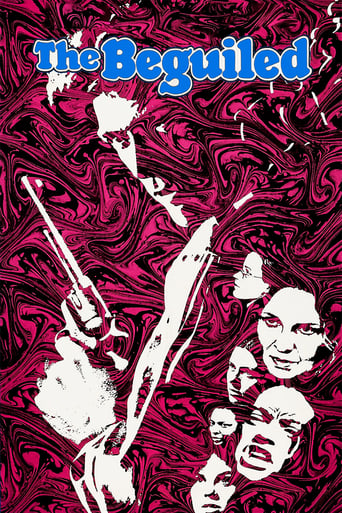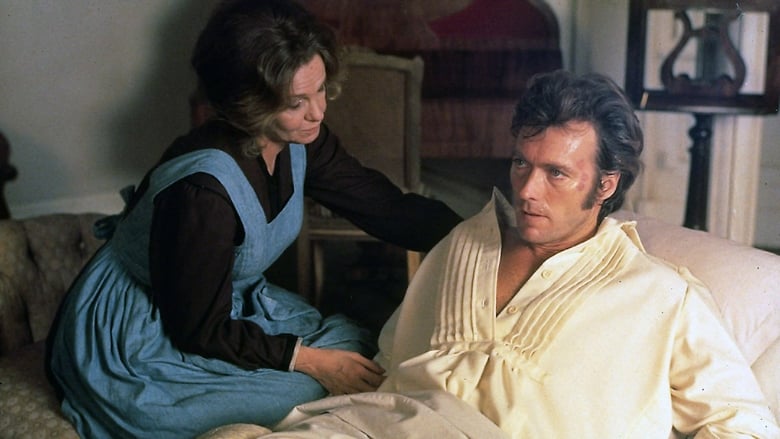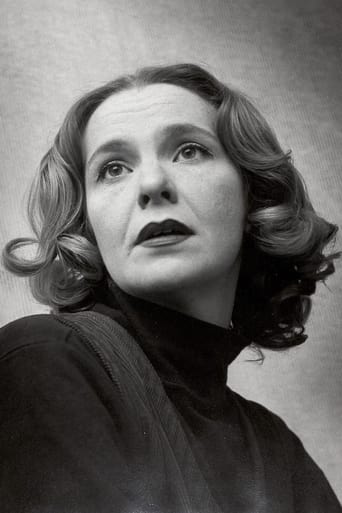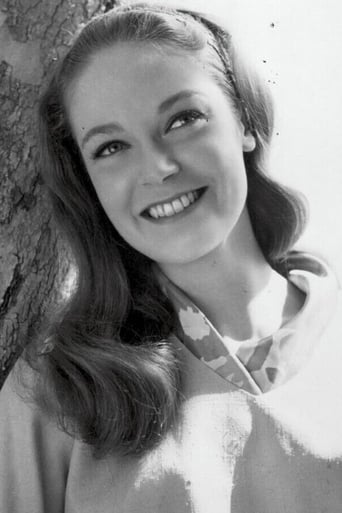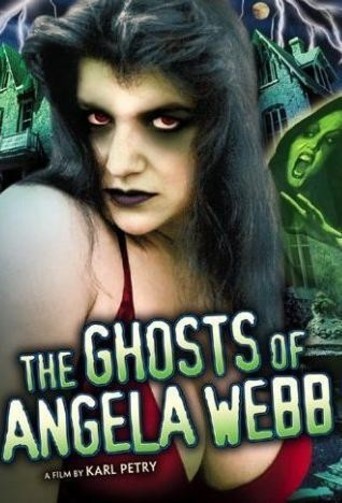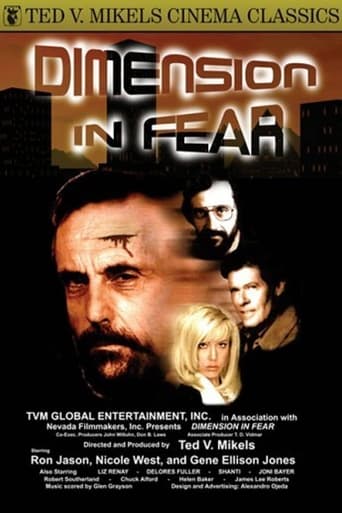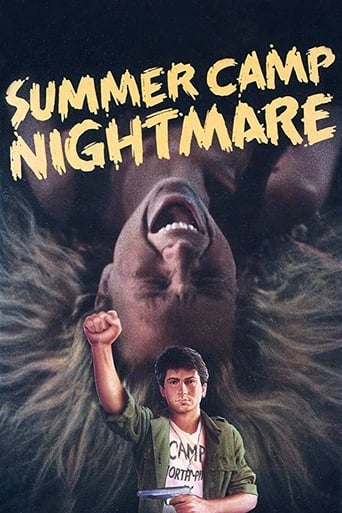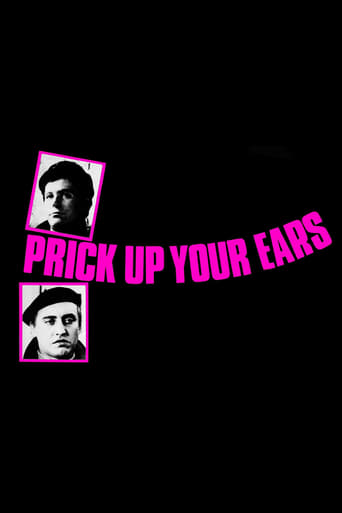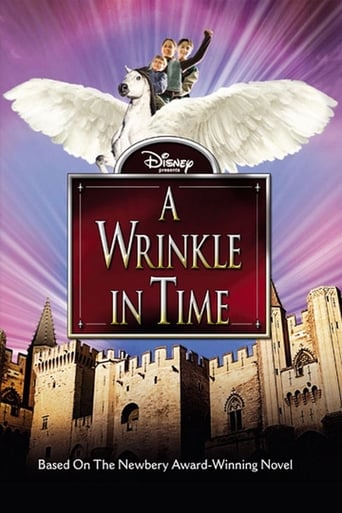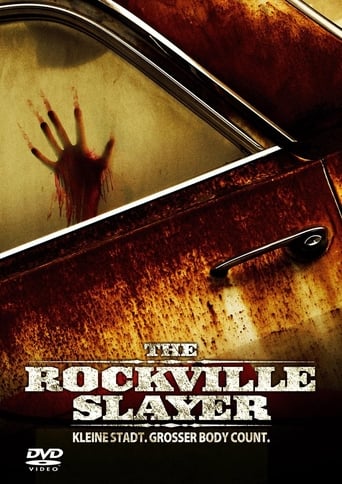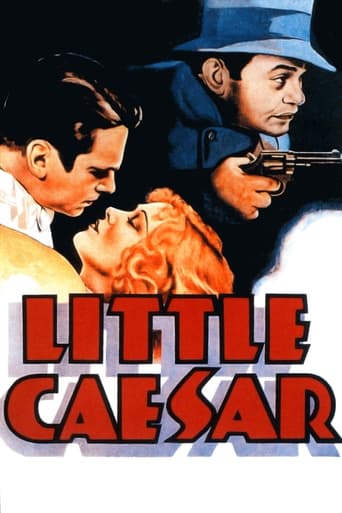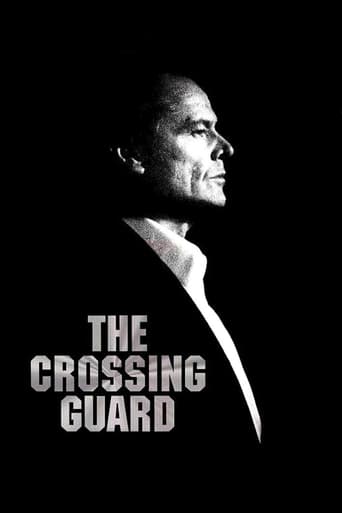The Beguiled (1971)
Offbeat Civil War drama in which a wounded Yankee soldier, after finding refuge in an isolated girls' school in the South towards the end of the war, becomes the object of the young women's sexual fantasies. The soldier manipulates the situation for his own gratification, but when he refuses to completely comply with the girls' wishes, they make it very difficult for him to leave.
Watch Trailer
Cast
Similar titles
Reviews
In truth, there is barely enough story here to make a film.
A great movie, one of the best of this year. There was a bit of confusion at one point in the plot, but nothing serious.
Let me be very fair here, this is not the best movie in my opinion. But, this movie is fun, it has purpose and is very enjoyable to watch.
Through painfully honest and emotional moments, the movie becomes irresistibly relatable
Don Siegel directs The Beguiled as a Jacobean revenge tragedy. It really is mostly about women and their repressed sexual desires which are awakened when they come across John McBurney (Clint Eastwood) an injured Union soldier who is brought to a Confederate girl's school.The headmistress, Miss Martha (Geraldine Page) does not notify the local militia of his presence. Instead her assistant Edwina (Elizabeth Hartman) their black servant Hallie (Mae Mercer) and the teenage school girls treat his wounds and fall for his rugged looks. McBurney a deserter knows how to charm his way to their hearts by deceit, only Hallie sees through him. Once his philandering is discovered Miss Martha plots brutal revenge as McBurney finds out about her lurid past.The Beguiled has attracted a cult reputation over the years. It is not a typical Eastwood western, as a film set in the civil war it is lot less about nobility. It has a Gothic anti hero who exploits the women's sexual yearnings.The Beguiled is a slow moody film with aspects of art house 1960s counterculture cinema. There are multiple exposures, quick flashbacks and dream sequences.
As the opening titles of The Beguiled flicker by with a collection of grainy photographs from the brutal American Civil War, it would seem we're in familiar tough, manly action territory, especially when the names of Don Siegel and Clint Eastwood flash on screen. These feelings appear to be confirmed as Eastwood grizzled Union officer John McBurney comes into shot, clearly wounded and hanging on for dear life following a bloody battle with Confederate soldiers. He is discovered by Amy (Pamelyn Ferdin), a 12 year old student at the nearby Seminary for Young Ladies, who quickly takes a keen interest in the handsome but battered young man. As some bloodthirsty Confederate soldiers trot by and they are forced to hide, John plants a lingering kiss on the child's mouth, which immediately cause feelings of discomfort for the viewer. No, The Beguiled is not your typical Siegel tough-guy actioner, but something all the more fascinating and complex.John is eventually smuggled back into the school run by Miss Martha Farnsworth (Geraldine Page), a woman with a secretive past of her own. She wants the Union soldier gone immediately, but the soldier is charming and badly wounded, so she and the fellow ladies of the school tend to his injured leg and give him a bed. He is kept under lock and key, but he is often visited by the curious ladies, including virginal teacher Edwina (Elizabeth Hartman) and precocious 17 year old student Carol (Jo Ann Harris). With Martha still insistent on turning him over to Confederate troops once he has regained his strength, John seizes the chance to seduce as many of them as he can, taking full advantage of their time away from men and natural curiosity towards the opposite sex. He becomes unnervingly comfortable with his methods of manipulation, and is soon playing the women off one another. But these ladies have seen it all before, whether it be a father, a sibling or a drunken soldier stumbling onto the school grounds with cruel intentions.The Beguiled is a film about jealousy, sexuality and bitterness, so it's no surprise that it flopped and didn't go down well with fans of Siegel's tougher, more straight-laced output. The film also threatens to venture into horror territory, as emotions begin to spill over and John's scheming becomes apparent. There were cries of misogyny upon the film's release, but although the claim is certainly open for debate, this is not a film by a director who hates women. To label the film misogynist would be to cruelly over- simplify it, as the likes of Martha and Edwina aren't just coy women to be easily taken advantage of, but incredibly complex characters both scarred and enlightened by past experiences with men. John is clearly the most loathsome character, an evil man who uses his physicality and charm to worm his way into their lives and gain their trust, and Siegel makes little attempt to make him sympathetic. It's an incredibly claustrophobic and intense experience, with career-best performances from Page and Hartman. It is Siegel's favourite of his extensive filmography, and it isn't difficult to see why.
"The Beguiled" follows John McBurney, a fallen Union soldier in the American Civil War who is reluctantly taken in at a rural girls' school in Mississippi. The headmistress, Martha, agrees to keep him there until his health has been restored. John begins to woo each of the women in the house, but his flirtations and manipulations land him in dangerous territory as the household begins to come apart at the seams.Directed by frequent Eastwood collaborator Don Siegel ("Dirty Harry"), this little-seen but much- loved thriller is a potent blend of Southern Gothic and psychosexual drama. All of its strengths aside (and there are many), "The Beguiled" is one of those rare films that plays a variety of different ways without ever really committing itself to one. It could be read as a meditation on the war, a feminist parable, an outright horror film, or even all three (and more) at once. It never quite leans one way or the other; it's just as much a feminist film as it is anti-feminist; just as much horror as it is drama. The screenplay, based on Thomas Cullinan's novel, is left open-ended. What we have before us is ultimately a character study on sexuality and human desire, and the way it's read it depends on individual perspective.The film begins with a haunting credit montage that plays over disturbing historical photos of the war. Sounds of horses, gunfire, and screaming narrate the credit sequence, which sets a tone of unease and instability from the first frame. The film is saturated with an oppressive Gothic atmosphere that underpins an array of situations between Eastwood and the women in the house— even the lighter (sometimes even darkly humorous) moments hint toward an impending reckless abandon. Moody cinematography accentuates the unease, and several haunting POV shots from Eastwood as he is carried by the women into the house (and later, into the dining room in one of the film's most famous and most violent scene) are unforgettable.Eastwood, who made a career for himself as a hyper-masculine sex bomb in his early years, plays against character—here, he is physically helpless, resorting to emotional manipulation that eventually backfires. His performance is memorable, though his character, despite being the film's center, seems to be given far less screen time in comparison to the rest of the female cast. Geraldine Page gives one of the best performances of her career as the sexually repressed headmistress who has a questionable romantic history. Page is terrifying and at times sympathetic, but, like the film as a whole, can never quite be pinned down, and that's part of her brilliance. Elizabeth Hartman is fantastic as well as the meek schoolteacher who wins Eastwood's affections, and Jo Ann Harris plays a Civil War Lolita who is as devious as she is charming. Pamelyn Ferdin is also striking in her performance as the youngest of the girls, and the catalyst for what brings Eastwood into the house, and eventually, out of itOverall, "The Beguiled" is something of an unsung classic. The strength of its performances alone is enough to warrant multiple viewings, but the ambiguity of its moral stance (if there even is one), and its candid yet dithering narrative make it an even more compelling watch. It's tense, hauntingly beautiful, and also downright unnerving in unexpected ways. Regardless of how it's read, the presentation is flawless. 10/10.
Gutter trash.Not because it doesn't try to be daring but because it's so filled with nickel-psychology that Don Siegel's The Beguiled doesn't get a 1 or a 2 out of 10. There are occasional moments of inspiration that get forgotten as Union soldier Clint Eastwood recovers from a gunshot wound in an all-girls academy. There's enough repressed sexual desire and dreaming of incest and lesbian smooching that the viewer almost has to start laughing. There's a serious movie somewhere under all this shock-value. The movie seemed to take about a week to run its course; I kept the information bar up at the top of the screen to show me how much was left. About the only thing I found interesting--prurience has to have some say here--was seeing an actress I thought was just lovely back in high school, Jo Ann Harris, cavorting above and below Eastwood. How times have changed. I would have given anything to see Harris naked when I saw the edited version of this ick-fest on NBC over 40 years ago. Now, the cave-dweller part of my brain was shouted down by the mature section. Ol' Oog scuttled back into his cave. I looked embarrassed for everyone involved in The Beguilded as I watched it and watched it and checked the time remaining, and watched some more.The psycho-babble of this movie is deafening. Linus' sister would have been proud.But she would have charged Charlie Brown more than a nickel for the nonsense.
